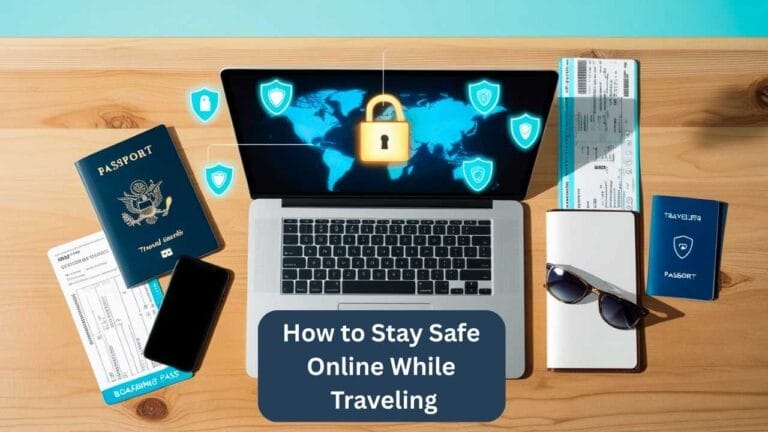Worried about hackers stealing your data when using airport Wi-Fi? You’re not alone. Every day, travelers lose money, personal photos, and even their identities because of simple online security mistakes. The good news? With a few smart habits, you can browse safely anywhere in the world.
I learned this the hard way when a client’s Instagram was hacked during a trip to Bali. One sketchy Wi-Fi login later, and her account was posting crypto scams to 20K followers. After helping her recover it (and seeing dozens of similar cases), I’ve created this foolproof system for traveling safely online, without slowing you down.
The Real Danger Isn’t Just Hackers: It’s Your Habits
Most travel-related hacks happen because we ignore basic protections in the name of convenience.
A 2024 McAfee study found:
- 73% of travelers use public Wi-Fi for banking (the #1 cause of stolen credentials)
- Only 12% enable two-factor authentication (2FA) before trips
- 41% reuse the same password across travel sites (airlines, hotels, etc.)
Real-World Example:
*”My client Raj thought his hotel Wi-Fi was safe, until a $3,000 charge appeared from a Moscow electronics store. The hacker had intercepted his email login at the airport lounge.”*
The Fix?
Treat every network like a hacker’s playground (even hotel Wi-Fi)
Assume your phone will get stolen (because 1 in 10 travelers lose theirs)
The Hidden Risk: Your Phone’s “Convenience” Features
Your phone’s auto-connect and location services are goldmines for thieves.
What Most People Miss:
- Bluetooth/Wi-Fi scanning (even when “off”) leaks your device ID
- AirDrop/File Sharing can let strangers send malware
- Public charging stations often have “juice jacking” malware
2025 Travel Hack Report:
58% of airport USB ports tested positive for data-stealing malware (Source: Kaspersky Lab)
Actionable Steps:
Disable these before traveling:
- Settings > Wi-Fi > Auto-Join Hotspots → Turn OFF
- Settings > Bluetooth → Disable when not in use
- Settings > AirDrop → Set to “Contacts Only”
Myth Debunked: “VPNs Make Me 100% Safe”
VPNs are essential, but they’re not magic forcefields.
The Truth:
- Free VPNs often sell your data (78% leak IPs according to VPNPro 2024)
- They don’t protect against phishing scams (like fake airline booking sites)
- Some countries block VPNs (UAE, China, Russia)
Better Approach:
- Use a paid VPN (ExpressVPN/NordVPN) + DNS encryption (like Cloudflare’s 1.1.1.1)
- Always check for HTTPS (not just the padlock icon)
Step-by-Step Travel Security Setup (15 Minutes)
Follow this checklist before your next trip:
Before You Leave:
- Enable 2FA on email/social media (use an authenticator app, not SMS)
- Install offline maps (Google Maps’ “Downloaded Areas”)
- Notify your bank to avoid frozen cards
At the Airport/Hotel:
- Use a travel router (like GL.iNet) for private Wi-Fi
- Bring your own charger + portable battery
- Never type passwords on shared computers
If Hacked:
Freeze cards via your banking app
Call your embassy if passports/IDs are compromised
Bonus: The “Dummy Wallet” Trick
Carry a decoy wallet with:
- An old gift card (looks like a credit card)
- Expired driver’s license
- $20 in local cash
Why It Works:
“When my bag was stolen in Barcelona, the thief took the dummy wallet, while my real passport and cards stayed hidden in my shoe.” (Travel pro Sarah K.)
Final Thought: Safety Doesn’t Mean Paranoia
Staying safe online while traveling requires proactive measures and continuous vigilance. By updating your devices, using strong passwords, avoiding public Wi-Fi for sensitive transactions, and monitoring your accounts, you can significantly reduce the risk of cyber threats. The Sun
Remember, cybersecurity is an ongoing process. Stay informed about the latest threats and best practices to protect your digital life wherever you go. Travel Sentry
You don’t need to ditch tech, just upgrade your habits. Start with one tip from this guide (like disabling auto-join Wi-Fi), and you’ll already be safer than 90% of travelers.
Need Help Fast? Bookmark this resource:
Now go explore, your data stays protected.





